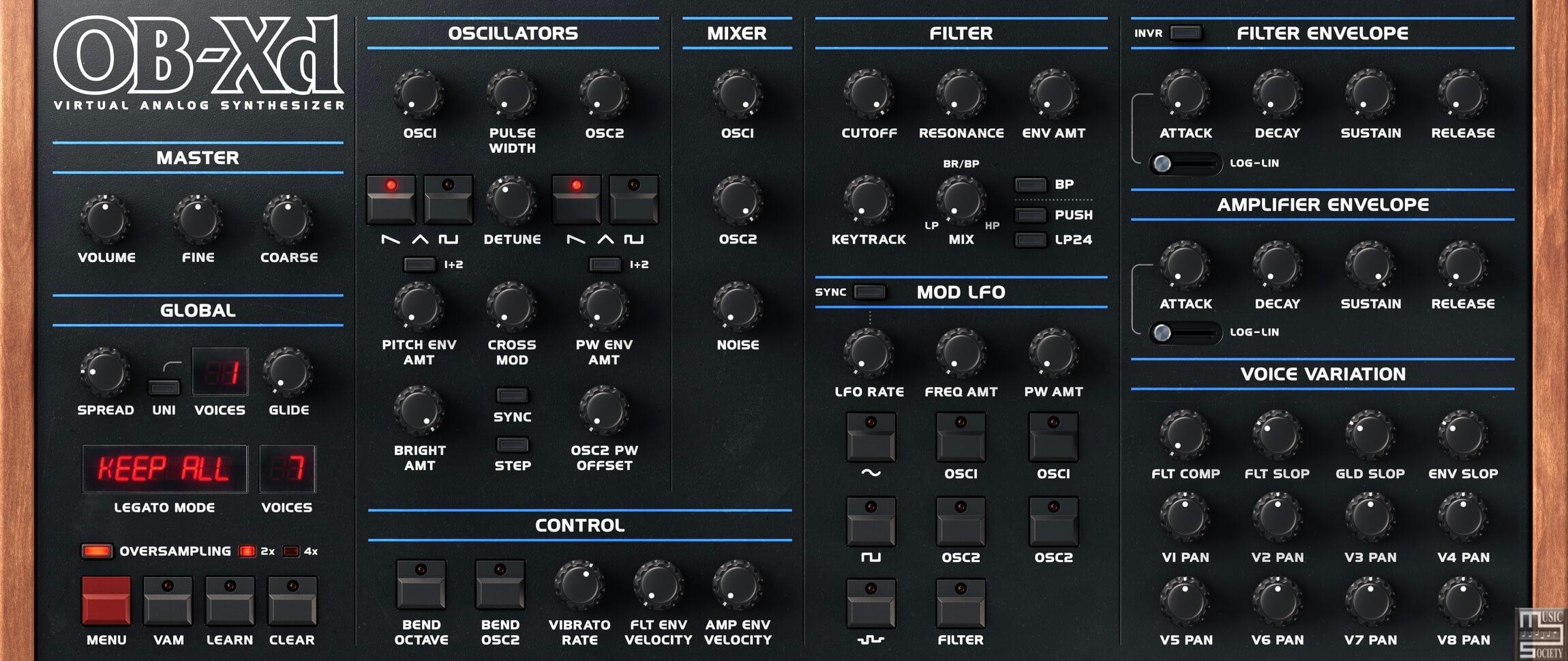
OB-Xd is a classic synthesizer with a timeless sound that continues to captivate musicians and producers alike.
With its rich, full-bodied tones and expansive sound design capabilities, the OB-Xd is the perfect choice for those looking to add a vintage touch to their music. Whether you’re producing electronic tracks, recording live instruments, or composing for film and television, the OB-X is an invaluable tool that will bring a unique and expressive quality to your sound. So why wait? Add an OB-Xd to your studio today and take your music to the next level!
The OB-Xd is a synthesizer that has been designed to recreate the sound and behavior of the Oberheim OB-X.
However, the original design of the OB-X was limited in some ways, so the OB-Xd includes a number of additional or altered features. One key feature of the OB-Xd is its implementation of micro random detuning, which helps to create a fuller, richer sound. Overall, the OB-Xd has been designed to produce a sound that is as good and as rich as the original OB-X.
Overview
While not copying originals, some of the features were taken to a better point. Continuous blendable multimode filter (HP-Notch(BP)-HP in 12 dB mode and 4-1 pole in 24 dB mode). Also, like many synths of the OB-X’s generation, the OB-Xd has no internal effects so its sounds and textures can be greatly enhanced by the use of additional processing like chorus, reverb, delay, etc.
Additionally, for those interested in micro-tuning, the OB-Xd comes equipped with support for MTS-ESP. This allows for more granular control over your tuning adjustments, perfect for the discerning synth musician.
Free version includes fully functional Standalone app, Audio Unit and VST plug-ins. Registered version delivers both 2.x and 3.x commercial rights1, AAX, VST3, and LV2 plug-ins and technical support to help you get the most out of the software.
What’s New in OB-Xd 3
Enhanced Oscillator Features: The update introduces new Pulse Width Modulation Controls for intricate sound shaping, enhancing the sonic possibilities of the oscillators.
PW Offset: Adjusts the pulse width of Oscillator 2 with a unipolar knob based on the PW knob’s setting.
PW Env: Modulates Oscillator 2’s pulse width with the Filter Envelope.
PW Env Both: 1+2 button allows the Filter Envelope modulation to affect both oscillators‘ pulse width.Advanced Filter Capabilities: Including Self-Oscillation, Filter Falloff Adjustment, and Adjustable Filter Envelope Shape, providing more control and variety in sound filtering.
Self-Oscillation: The 12dB filter now self-oscillates at high resonance levels.
Filter Falloff Adjustment: A new FLT CMP knob in the Voices section influences cutoff scaling.
Adjustable Filter Envelope Shape: Blends between exponential and linear shapes for the attack.
Filter Envelope Inversion: A new button for inverting the Filter Envelope output.
Enhanced Filter Keytracking Control: A refined knob offers precise control over the filter’s response to keyboard tracking.
Level Difference Knob: Ensures consistent audio output during filter adjustments.Refined Attack Envelope Shape: This feature introduces a sophisticated logarithmic-linear attack slider, offering unparalleled flexibility for dynamic sound sculpting. The slider enables users to precisely control the attack phase of sounds, ranging from subtle, gentle slopes for softer onsets to sharp, aggressive inclines for more pronounced attacks.
This dual-mode approach allows for a wider array of sonic textures, providing musicians and producers with the tools to tailor the attack characteristics of their sounds, whether they’re aiming for a natural, smooth progression or seeking a more abrupt, impactful onset.
Oversampling Selection: Available in the registered version, this feature offers options for different sound quality requirements, including no oversampling (1x), 2x, or 4x.
MIDI and Preset Bar Enhancements: Improved usability and functionality, making it easier to manage and access MIDI controls and presets.
LFO Synchronization: Ensures perfect timing by syncing the internal LFO with your DAW’s BPM
System Requirements
PC: Windows 7 or a newer version.
Mac: macOS High Sierra or a newer version. Works on both x86 and ARM.
Linux: Ubuntu 18 or a newer version.
On Windows and macOS, a one-time internet connection is required to activate the software license. After this, users can use the software offline.
Optimal performance requires an Intel Core i3 (x86) or higher, an Apple Silicon M series (ARM), and a minimum of 4 GB RAM.
The free version of OB-Xd is fully functional, with no major limitations on its features, but it prohibits commercial use.
Free version includes fully functional Standalone app, Audio Unit and VST plug-ins.




